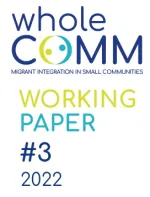Immigrant integration in small and mediumsized towns and rural areas: local policies and policymaking relations in Belgium

Working Paper No. 3 / 2022 (Belgium)
This report looks at immigrant integration initiatives developed at the local level, paying particular attention to the multi-level governance dynamics involved. The findings are primarily based on interviews conducted in the four selected municipalities in Belgium (two in the Flemish-speaking region of Flanders and two in the Francophone region of Wallonia). The report provides an overview of 1) local integration initiatives; 2) the local integration frames; 3) the multilevel governance dynamics; 4) horizontal and vertical conflicts between local actors working on immigrant integration; and 5) the decision-making processes that have preceded the implementation of immigrant integration policies (or the lack thereof) for each of the four towns studied. The report finds that the extent to which local governments intervene in immigrant integration governance differs drastically across the regions. The role and funding that local governments have received from the Belgian meso-levels (the regions and communities), which were granted the competence for immigrant integration policies in the 1980s, explains whether local governments have developed interventionist or laissez-faire approaches towards immigrant integration. Whilst the region of Flanders has granted local governments the “coordinating role” on immigrant integration, followed by regional funding schemes, in Wallonia local governments have received little responsibilities or funding for this domain and immigrant integration has been outsourced to the regional integration centres. Still, also within the regions, local integration approaches vary significantly. Particularly the two Flemish localities have developed immigrant integration policies sensitive to the specific local context. We find that party politics, previous experience with ethnic diversity, and socio-economic factors mainly shape the local course of action.